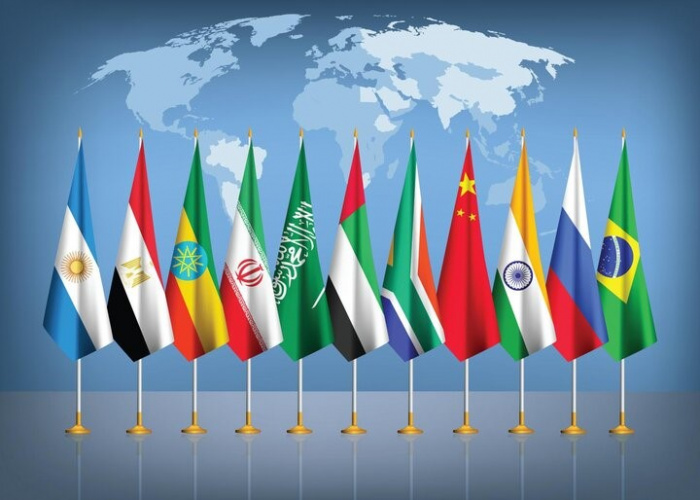"BRICS" is a symbol of stability in today's world/Development of artificial intelligence infrastructure

Shen Yi, Director of the BRICS Studies Center at Fudan University, discussed the reasons for the expansion of BRICS, the group’s recent achievements, and the prospects for future cooperation in a conversation. He sees BRICS as an innovative model for cooperation among countries with different cultural and historical backgrounds that seek peaceful coexistence and common development. The details of the conversation are as follows:
Why is the expansion of BRICS inevitable and what is the economic appeal of this group?
Shen Yi, Director of the BRICS Studies Center at Fudan University, believes that BRICS member countries share common values and a common understanding of how to govern the world and pursue peaceful coexistence despite cultural and historical differences.
He said: “As an innovative mechanism, BRICS is the best example for countries that are looking for new ways to cooperate. This group symbolizes stability and security in today’s world, and for this reason, developing countries and emerging markets are very eager to join it. BRICS membership provides opportunities for cooperation, assistance, and solutions for economic development.
What are the most important recent achievements of BRICS that have paved the way for future cooperation?
Shen Yi, a professor of international relations at Fudan University, points to the establishment of the New Development Bank (NDB) as one of the key achievements of BRICS.
He added that unlike institutions such as the World Bank and the International Monetary Fund, the bank provides more constructive financial assistance to countries in need of infrastructure. Also, higher education cooperation, such as the BRICS University Alliance, allows the younger generation of these countries to share their knowledge and resources. In addition, BRICS has paved the way for cooperation in the areas of digital technology, infrastructure, and industrial development by establishing partnerships in emerging industries.
What impact does the Chinese President’s visit to Russia have on bilateral relations and the strategic dynamics of BRICS?
Chinese President Xi Jinping’s visit to Moscow in May 2025 was of great significance not only for China-Russia relations but also for the development of BRICS and even global stability. One of the most important outcomes of the visit was the joint statement of China and Russia on ensuring global strategic stability. The statement emphasizes the prevention of conflict between nuclear powers and opposition to the deployment of offensive missile systems near nuclear states. The two countries have also launched extensive technical cooperation in areas such as artificial intelligence and non-proliferation of weapons of mass destruction.
Which infrastructure projects should be prioritized by BRICS countries?
Shen Yi, director of the BRICS Center for Studies, considered the development of AI-based infrastructure as the top priority for BRICS countries and the global South. In his opinion, BRICS countries should develop a comprehensive roadmap for advancing this infrastructure. This requires huge investment and the establishment of joint centers for sharing AI technologies so that member countries can benefit from each other’s capabilities.
What new initiatives can strengthen cooperation in technology and sustainable development in BRICS?
Shen Yi believes that BRICS countries have great potential for cooperation in technology and industry.
The director of the BRICS Studies Center added that Russia has competitive advantages in advanced machinery manufacturing and materials production, China in ICT infrastructure and large language models (LLM), Brazil in advanced industries such as aircraft manufacturing, and India, South Africa and Saudi Arabia in their specialized fields. He suggests that member countries develop a clear roadmap for technological cooperation.
What is the prospect of cooperation between universities, the private sector and governments within the BRICS framework?
Shen Yi sees cooperation between the private sector and the government as a practical way to strengthen economic cooperation.
In his opinion, the BRICS Studies Center of Fudan University helps facilitate trade and investment among member countries by creating information sharing platforms. In the current geopolitical situation, BRICS countries are better options for trade and investment due to their stability and certainty.
What is the role of the BRICS Studies Center of Fudan University in strengthening academic dialogue?
Shen Yi emphasizes that the center is a pioneer in BRICS studies and helps advance practical cooperation by providing high-quality research and policy proposals. The center played a role in the decision to establish the headquarters of the New Development Bank in Shanghai and the launch of the BRICS University Association, and holds educational programs such as the BRICS Youth Summer School every year.
How important are cultural and educational exchanges in building trust between nations?
According to Shen Yi, cultural and educational exchanges are of particular importance due to the cultural and historical diversity of the BRICS countries.
Yi continued: These programs contribute to mutual understanding among the younger generation and create deeper relations between member countries. These exchanges will pave the way for sustainable cooperation in the future.
Which soft power initiatives are most effective in promoting mutual understanding among BRICS countries?
Shen Yi believes that respect for each other’s core interests and an open and honest approach to cultures are the distinguishing features of BRICS countries. These characteristics help member countries overcome cultural and historical differences and build more effective cooperation based on mutual understanding of each other’s cultural and historical heritage.


